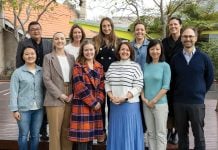
Aunique tradition at Belmont Hill School, a boys’ school in Boston, Massachusetts, sees every graduating student – quite literally – carve a piece of the school’s history.
Since 1927, Form VI (Year 12) students have designed and etched 12×12 inch mahogany panels, which are then hung on the walls of the school as an enduring symbol of their time at and contribution to the school. The walls of panels, now in excess of 3,000, are a permanent and prominent celebration of its community.
With its rich sense of tradition and togetherness, Belmont Hill School aptly embodied the International Boys’ Schools Coalition (IBSC) 2025 Conference theme, ‘Better Together’. With nearly 700 delegates from over 15 countries, it was a powerful convergence of global educators committed to advancing boys’ education.
Melbourne Grammar School was represented by three Wadhurst and Senior School staff members, John Donaldson, Head of Caffin House, Anthony Taranto, Head of Bruce House, and myself as Head of Wadhurst.
We were proud to facilitate two workshops: ‘Better Together – Why Middle School Matters’ and ‘Belonging, Collaboration, and Help-Seeking Interventions’.
Drawing on our experience and research at Melbourne Grammar School, the workshops emphasised the need for programs and structures that support belonging and understand the reality of adolescent development in an increasingly complex world.
Belmont Hill resident psychologist Michael Thompson reflected on this theme in a morning Chapel reflection, affirming that boys’ schools offer a unique opportunity to nurture deep friendships and emotional growth. He challenged educators to measure boys on their own developmental trajectories rather than comparing them to girls, advocating for all-boys secondary schools that, in their very fabric, seek to understand and celebrate the emotional lives and journeys of students.
The need to promote and nurture belonging in all-boys schools partnered well with the thread of cultivating emotional bravery. Professor Niobe Way, author and developmental psychologist from NYU, shared decades of research showing that boys crave connection, care, and to be known; yet often struggle against cultural norms that equate masculinity with emotional suppression. Her provocation was to find, carve, and create spaces where boys can express their vulnerability and kindness, and to redefine strength in terms of empathy, active listening, and relational depth.
The impact and potential future implications of artificial intelligence on education were hotly discussed. While technology offers new possibilities, we know that education is most impactful when rooted in human connection. This challenges us as educators to prioritise experiential learning and to ensure that a Melbourne Grammar School education prepares students not just for their first job, but for life.
Across workshops, sessions and conversations, the 2025 IBSC Conference affirmed a shared commitment: to nurture boys who are not only academically capable, but emotionally intelligent, socially connected, and ethically grounded.
In a world of rapid change, these qualities are not optional – they are essential.

Head of Wadhurst
Melbourne Grammar School’s participation in the 2025 ISBC conference was supported by Friends of Grammar – Senior School.


